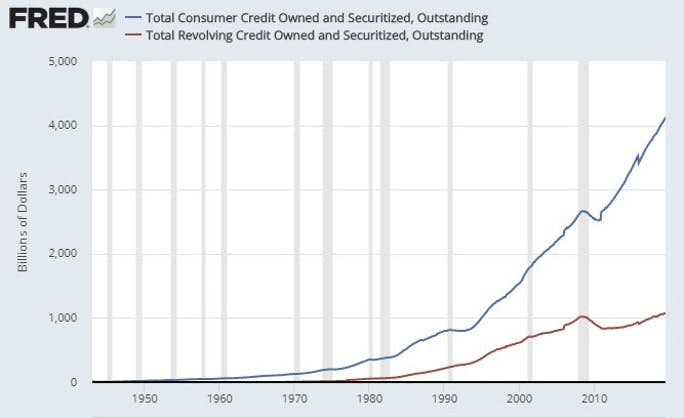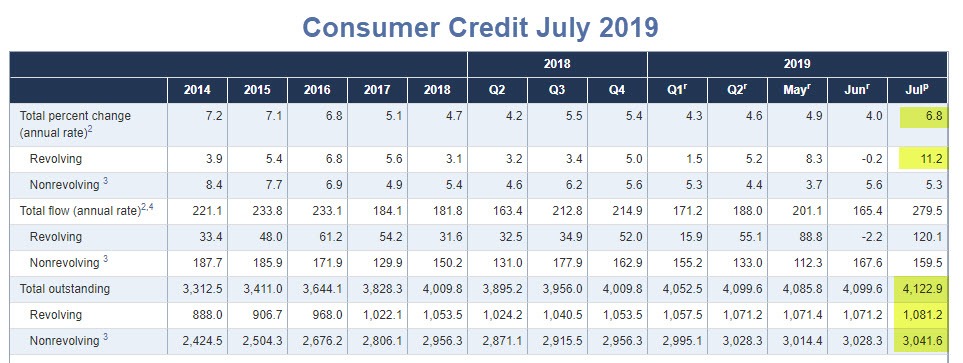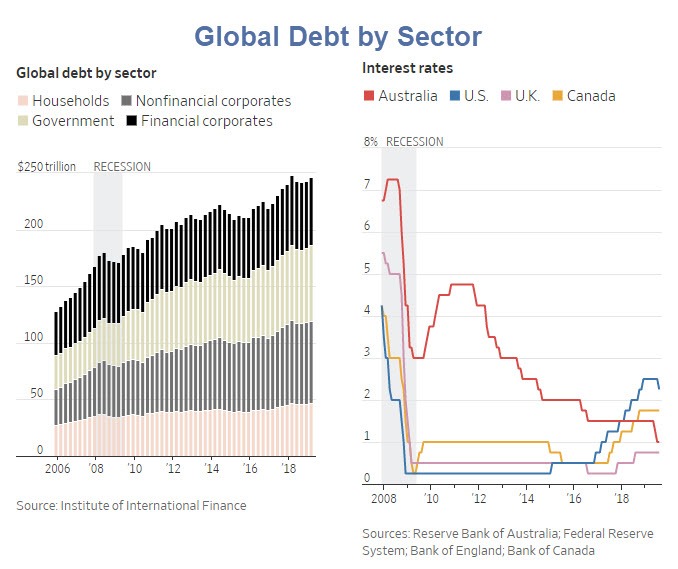
The Fed's consumer credit report shows a jump in total credit and an even bigger jump in credit card debt.

The Fed's Consumer Credit Report shows consumer went on another credit card binge in July.
Econoday economists expected a boost of $16.1 billion in a range of $15.2 billion to $17.0 billion.
Credit jumped $23.3 billion.
High Debt Levels Are Weighing on Economies
The Wall Street Journal reports High Debt Levels Are Weighing on Economies.
Debt owed by governments, businesses and households around the globe is up nearly 50% since before the financial crisis to $246.6 trillion at the beginning of March, according to the Institute of International Finance, an association of global financial firms.
The borrowing helped pull economies out of the nasty recession, but left them with high debt burdens that make it harder for policy makers to raise rates. It also makes consumers and businesses more likely to pull back from spending money on new goods if economic conditions weaken.
“Globally, you are at worryingly high levels,” said Sonja Gibbs, managing director for global policy initiatives at the IIF.
In the U.K., Canada and Australia, central bankers have backtracked from rate increases in the past two years after consumers got bruised more than expected. U.S. consumers, who have borrowed to pay for college, cars and everyday spending, have been less affected because their debt burdens are much lower relative to their incomes.
“The world is in a delicate equilibrium,” said Mark Carney, governor of the Bank of England, in a February speech. “The sustainability of debt burdens depends on interest rates remaining low and global trade remaining open.”
Global Debt by Sector

Central banks new lower rates to keep the debt bubble growing.
Delicate Equilibrium?
The world is in a delicate equilibrium,” said Mark Carney, governor of the Bank of England.
Equilibrium Definition: A state in which opposing forces or influences are balanced.
Families Go Deep in Debt to Stay in the Middle Class
Here is an article from last month whose headline I thought to be very peculiar: Families Go Deep in Debt to Stay in the Middle Class.
The American middle class is falling deeper into debt to maintain a middle-class lifestyle.
Cars, college, houses and medical care have become steadily more costly, but incomes have been largely stagnant for two decades, despite a recent uptick. Filling the gap between earning and spending is an explosion of finance into nearly every corner of the consumer economy.
Consumer debt, not counting mortgages, has climbed to $4 trillion—higher than it has ever been even after adjusting for inflation. Mortgage debt slid after the financial crisis a decade ago but is rebounding.
Student debt totaled about $1.5 trillion last year, exceeding all other forms of consumer debt except mortgages.
Auto debt is up nearly 40% adjusting for inflation in the last decade to $1.3 trillion. And the average loan for new cars is up an inflation-adjusted 11% in a decade, to $32,187, according to an analysis of data from credit-reporting firm Experian.
Unsecured personal loans are back in vogue, the result of competition between technology-savvy lenders and big banks for borrowers and loan volume.
Late Stage Credit Bubble
Ability to buy things one cannot really afford does not make or keep someone in the "midddle class".
Those living beyond their means are not in the class they pretend to be.
There is no "equilibrium" here. Wages are not keeping up with needs and desires.
Rather, these reports show a late stage credit bubble the Fed desperately wants to keep inflating.
